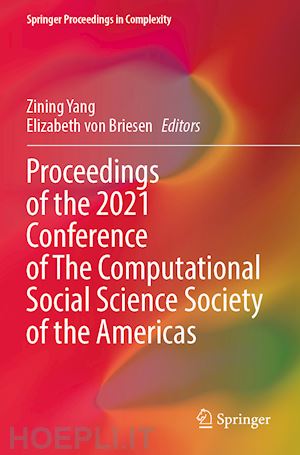
Questo prodotto usufruisce delle SPEDIZIONI GRATIS
selezionando l'opzione Corriere Veloce in fase di ordine.
Pagabile anche con Carta della cultura giovani e del merito, 18App Bonus Cultura e Carta del Docente
This book contains a selection of the latest research in the field of Computational Social Science (CSS) methods, uses, and results, as presented at the 2021 annual conference of the Computational Social Science Society of the Americas (CSSSA). Computational social science (CSS) is the science that investigates social and behavioral dynamics through social simulation, social network analysis, and social media analysis.
The CSSSA is a professional society that aims to advance the field of computational social science in all areas, including basic and applied orientations, by holding conferences and workshops, promoting standards of scientific excellence in research and teaching, and publishing research findings and results.
Dr. Zining Yang is Senior Manager at Southern California Edison. She also works as Adjunct Professor at California State Polytechnic University in Pomona and Associate Director at the TransResearch Consortium. She sits on the Board of the Computational Social Science Society of the Americas (CSSSA) and serves as Scientific Advisory Board Member for Human Factors and Simulations. She received her Ph.D. in Computational and Applied Mathematics and Political Economy from Claremont Graduate University in 2015.
Her research interests include Data analytics, machine learning, modeling and simulation, complex adaptive systems, agent-based models, and network analysis. She has been published numerous times in the fields of computer science, economics, public policy, and political science. She has been identified as an outstanding researcher by the government, worked on a National Science Foundation-sponsored project, and won multiple awards from various organizations, including the Ministry of Education of the Peoples Republic of China; International Social Computing, Behavioral Modeling and Prediction; and the International Institute of Informatics and Systemics.
Dr. Elizabeth von Briesen is Assistant Professor of Computer Science at Elon University and is Member of the Board of the Computational Social Science Society of the Americas. She received her Ph.D. in Computing & Informatics from the University of North Carolina at Charlotte in 2020. Her research interests are focused on the study of complex adaptive systems using computational techniques, particularly with respect to social systems experiencing identity-based conflict. She primarily works with agent-based models and performs data mining and sentiment analysis to inform those simulations. Finally, in her current position, she strives to contribute toward an evolving undergraduate computer science experience through research, service, and high-quality, innovative teaching.











Il sito utilizza cookie ed altri strumenti di tracciamento che raccolgono informazioni dal dispositivo dell’utente. Oltre ai cookie tecnici ed analitici aggregati, strettamente necessari per il funzionamento di questo sito web, previo consenso dell’utente possono essere installati cookie di profilazione e marketing e cookie dei social media. Cliccando su “Accetto tutti i cookie” saranno attivate tutte le categorie di cookie. Per accettare solo deterninate categorie di cookie, cliccare invece su “Impostazioni cookie”. Chiudendo il banner o continuando a navigare saranno installati solo cookie tecnici. Per maggiori dettagli, consultare la Cookie Policy.